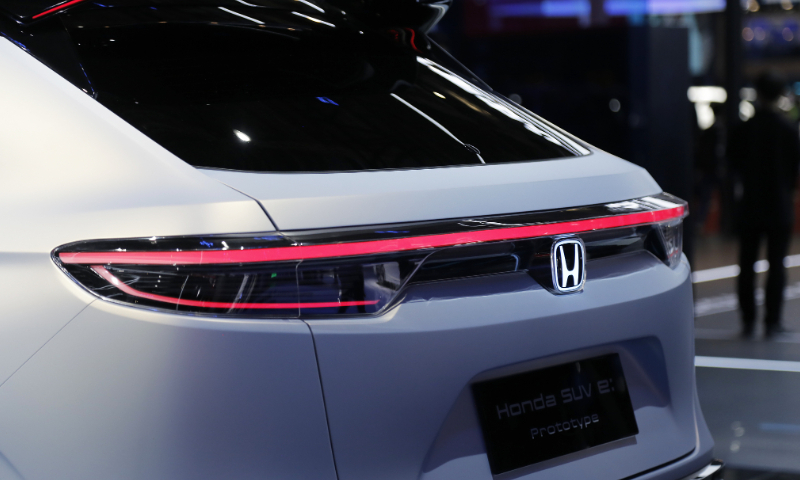China remains key market for Japanese, South Korean NEV firms, despite external disruptions: insiders

Honda's electric SUV Prototype is shown at the Shanghai Auto Show on April 20, 2021. Photo: VCG
China remains the key destination market and an indispensable part of the supply chain for Japanese and South Korean car firms, especially new-energy vehicle (NEV) makers, despite the rising pressure from the US to decouple from China, industry insiders said.
Several major players in the NEV industry have released their plans recently for expanding their investment in plant-building in China, indicating a positive outlook for the market based on its huge demand and the complete supply chain, the key factors that support business growth.
H-ONE, a parts company owned by Japan's Honda, has announced that it will establish a subsidiary in China to manufacture and sell parts for electric vehicles, Japan-based media outlet Nikkei reported on Wednesday.
The Japanese company will deliver body parts and other components to a new plant for NEVs built by Honda, and also plans to become a supplier for local NEV companies in China, the report said.
It comes just a few weeks after Japanese media reports claimed that Honda Motor was planning to reorganize its global parts supply chain, considering the decoupling of the Chinese mainland and other regions, according to media reports.
Speculation over supply chain decoupling is lingering as US President Joe Biden signed the Inflation Reduction Act of 2022 (IRA) on August 16, which showed the country's desire to curb China's influence in the new-energy sector, experts said.
The bill makes it more clear that the long-lasting true intention of the US is to strangle China's new-energy rise, in case it was not obvious enough when the US cracked down on Chinese solar panel makers in Northeast China's Xinjiang with the allegations of the "forced labor," Lin Boqiang, director of the China Center for Energy Economics Research at Xiamen University, told the Global Times in a recent interview.
However, the US' attempt may not serve its purpose, given that the Chinese supply chain has proved resilient and complete, and the corresponding market has become the largest in the world, experts said.
Chen Shihua, vice secretary general of the China Association of Automobile Manufacturers (CAAM), told the Global Times on Wednesday that the Chinese car market is the world's largest in terms of capacity and potential. Also, the supply chain is complete, and these factors explain why there are more foreign car makers and suppliers expanding their investment in China, Chen noted.
"Now many Japanese and Korean car companies have set up OEMs in China, and in the future, more international parts suppliers will set up factories in China," Chen said.
China is also the world leader in terms of car exports. From January to August, China exported 1.817 million vehicles, a year-on-year increase of 53 percent, of which NEV exports reached 328,000 units, a year-on-year increase of 98 percent, exceeding the level of last year, according to data from the CAAM.
To hitchhike on the booming trend of the domestic NEV market, leading global producers have actively developed their business layout in China.
For example, South Korea's LG New Energy has increased its lithium battery production capacity plan to 540 gigawatt-hours by 2025, the Global Times learned from the company on Wednesday.
The construction of LG New Energy's ninth factory in East China's Nanjing has begun, and it is expected to be completed and put into operation in 2023 to meet the growing customer demand, the company said.
"The Chinese market is huge and the NEV share takes up to 60 percent of the world total. Under these circumstances, no NEV producers including those from the US can truly decouple with China," Cui Dongshu, secretary general of the China Passenger Car Association, told the Global Times on Wednesday.
JPMorgan Chase previously predicted that the growth rate of domestic electric vehicle sales would be about 30 to 40 percent per year, and this growth rate will be maintained until 2030, cnstock.com reported.
Data from the China Automobile Association shows that from January to August, the cumulative sales of NEVs in China reached 3.86 million, an increase of 115 percent from 1.799 million in the same period last year, significantly higher than JPMorgan Chase's forecast.
